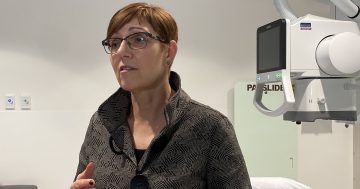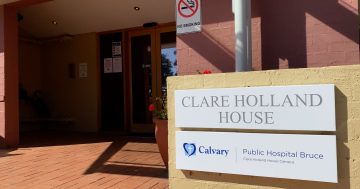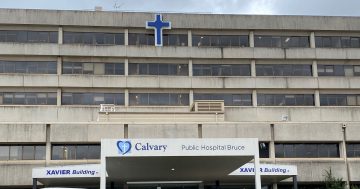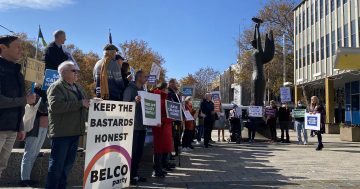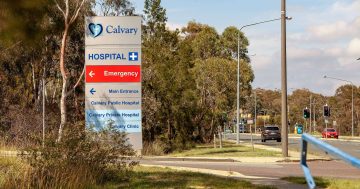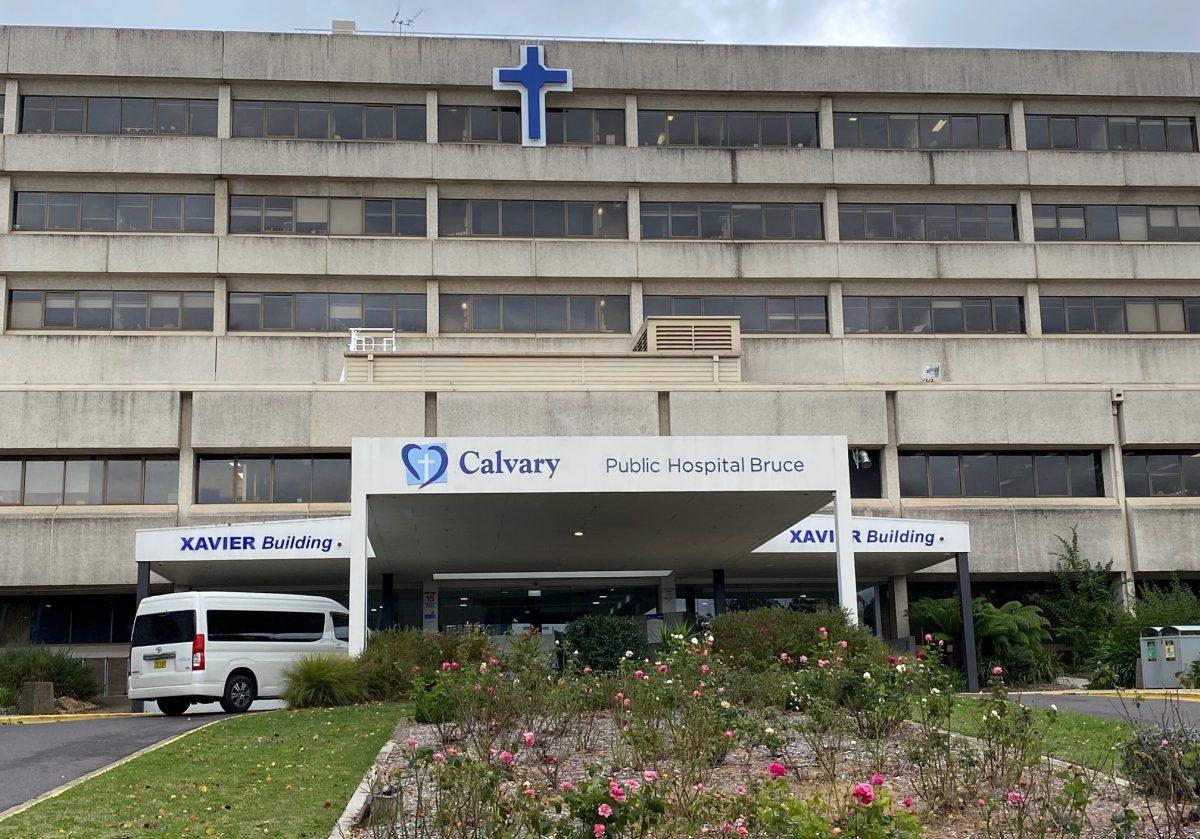
The messy saga around the ACT Government’s proposed acquisition of Calvary Public Hospital Bruce continues, with Calvary Health Care indicating legal action is its last option left. Photo: Claire Fenwicke.
Calvary Health Care has indicated legal action is its “only response left” regarding the ACT Government’s proposed acquisition of Calvary Public Hospital Bruce.
It follows confirmation from the ACT Government that it intends the Health Infrastructure Enabling Bill – the law which would legalise the takeover – to be debated and passed in full tomorrow (31 May).
On Tuesday (30 May), Calvary Health Care said unless the government agreed to adjourn debate on the bill to “make room for genuine discourse”, it would have no choice but to escalate the matter.
“Our review of the proposed legislation and associated regulation indicates that just terms are simply not available and outside of this, there is no indication that commercial terms are available to resolve this matter,” Calvary National Chief Executive Martin Bowles said.
“All we have is an announcement and an imposed unrealistic timeline that has distressed our people and could ultimately put clinical safety at risk.”
Calvary Health Care said it would continue to support staff while the court considered the legal challenge, if it transpires.
This seems imminent, as Health Minister Rachel Stephen-Smith stated today she fully expected the Health Infrastructure Enabling Bill will pass.
She will introduce some amendments in the Legislative Assembly on Wednesday, which she said were “minor and technical”.
“[The amendments] are all around tightening up some language in the bill and making sure that it is as simple to understand and as straightforward as possible and that it will really support a smooth transition of services from Calvary Health Care to Canberra Health Services,” Ms Stephen-Smith said.
“There is nothing in these amendments that doesn’t completely support the original intention of the bill and the way it has been drafted.”
Ms Stephen-Smith said she was “very confident” the legislation would stand up to any legal challenge.
“The announcement from Calvary Health Care does not change our plans to debate and pass legislation tomorrow,” she said.
“From our perspective, any legal challenge is a separate matter and will be responded to in parallel with the transition.
“The ACT Government will continue to prioritise, and expects that Calvary will also prioritise, continuity of quality safe patient care during the transition.”
She called on Calvary’s national office team to think about staff and consumers, and provide certainty of a smooth transition.
“We have already heard that many staff are keen to engage actively in the transition process and we hope Calvary will not seek to put barriers in the way of this,” Ms Stephen-Smith said.
A Calvary spokesperson said its priority was the interests and welfare of staff.
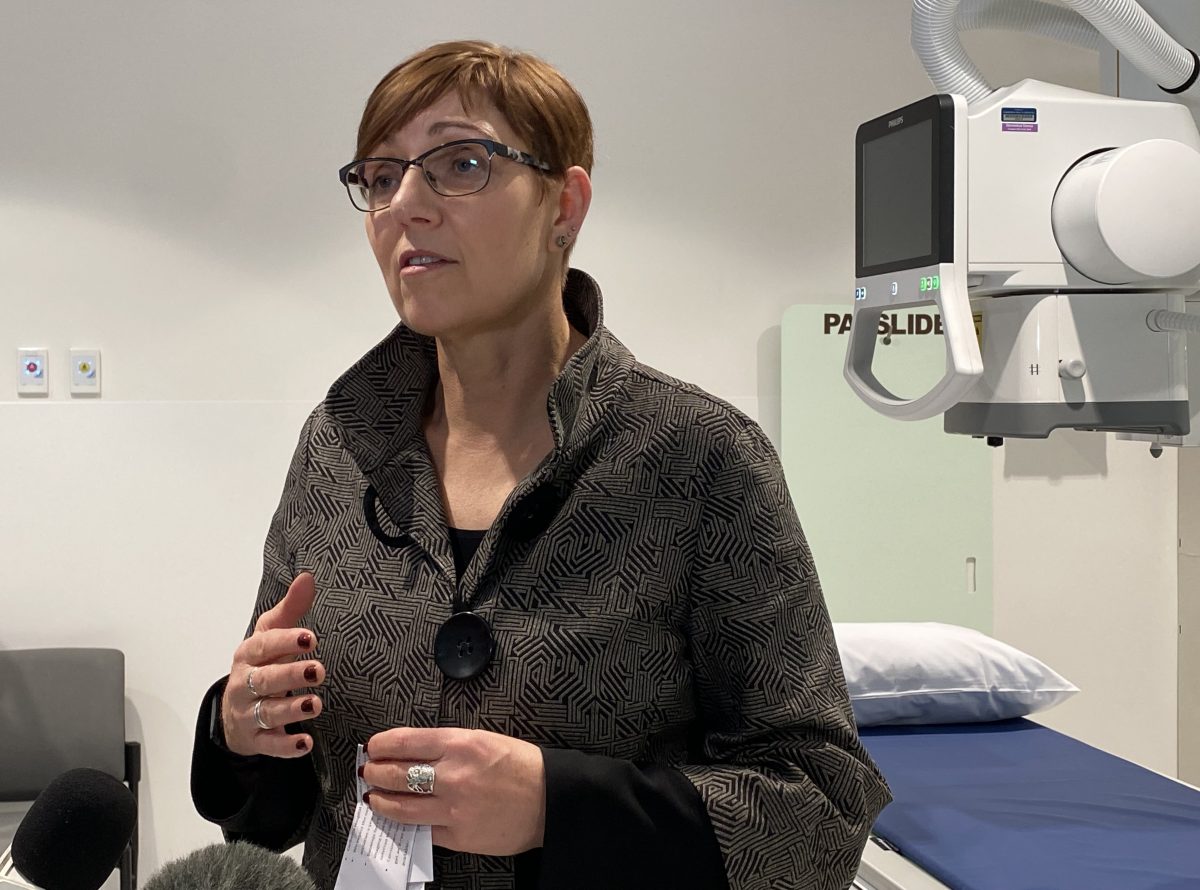
Health Minister Rachel Stephen-Smith expected the acquisition bill to pass the Legislative Assembly. Photo: Claire Fenwicke.
Other concerns were also raised over the future of Canberra’s palliative care services, the concerning culture at Canberra Hospital and whether the ACT Government’s takeover of Calvary Public has breached an enterprise bargaining agreement.
The Australian Medical Association’s (AMA) ACT branch said its key demands were for Calvary Hospital to stand apart from the Canberra Hospital and keep its workplace culture.
AMA ACT president Professor Walter Abhayaratna said while some progress has been made in talks with the government, senior medical staff were still “wary” of its plans.
“The message from our town hall meeting was that senior doctors do not want the Canberra Hospital culture imposed on them,” he said.
“They’re not against collaboration, but they don’t want structures simply imposed on them.
“The trust deficit is significant, and the ACT Government will need to work hard to bridge the gap.”
The Australian Nursing and Midwifery Association (ANMF) claimed lack of consultation from the government over the acquisition process breached its enterprise bargaining agreement.
A statement from branch secretary Matthew Daniel said under the ACT Public Sector Nursing and Midwifery Enterprise Agreement 2020-2022 (section 159), “effective consultation” was needed with employees and their representatives, including unions, on workplace matters.
The union questioned how members could be satisfied the ACT Government and public service had considered all relevant matters to patient care when staff weren’t consulted, given Canberra Hospital and Calvary Public Hospital Bruce have different clinical policies, procedures and processes.
However, the ANMF ACT was also critical of Calvary, stating it had allowed “battlelines” and “wargaming” to play out in the media.
“It does not appear Calvary have genuinely considered the views of its workforce and do not appear to have sought to work collaboratively with the ACT Government to ensure the health and well-being of their Nurses and Midwives,” the statement said.
“And it is still not clear how co-operative Calvary will be, if and when the legislation is enacted.”
Questions were also raised over community palliative care services provided by Clare Holland House, such as the home-based, PEACE Team, outpatient clinics, allied health and spiritual/pastoral care.
Ms Stephen-Smith argued community consultation with Calvary Public staff and their union representatives hadn’t been possible thus far because Calvary staff currently work for a private employer.
She promised a draft transition plan would be circulated to key stakeholders and staff as soon as the Health Infrastructure Enabling Bill was passed so consultation could begin immediately.
Ms Stephen-Smith said she had spoken with representatives from Clare Holland House and heard their concerns about external services as part of negotiations.
She blamed Calvary Health Care for putting Clare Holland House staff in this uncertain situation in the first place.
“[It] has, for many years, resisted our requests to establish Clare Holland House under a formal, separate contract,” Ms Stephen-Smith said.
Ms Stephen-Smith said she had been clear from the outset the hospital would maintain its own identity.












